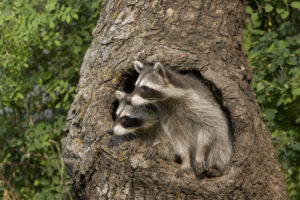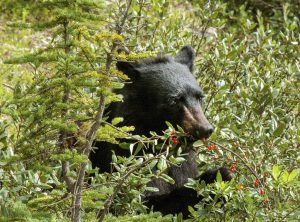 The Sunshine Coast is home to a rich variety of wildlife, including deer, raccoons, coyotes and bears.
The Sunshine Coast is home to a rich variety of wildlife, including deer, raccoons, coyotes and bears.
We can help reduce conflicts with wildlife by making sure that waste is kept secure at all times, ripe fruit is removed, BBQs are kept clean, and bird feeders are suspended and limited to winter use.
To help enforce the measures described above, Council adopted a Wildlife Attractant Bylaw in July 2021. Read more about the bylaw here.
If you experience a confrontation with, or feel threatened by a wild animal, immediately report it to the Conservation Officer at 1-877-952-7277, or the RCMP.
Living with Bears
 There are many bears living on the Sunshine Coast. To prevent their unnecessary destruction, it is essential that all residents (and visitors), first, become educated about how to live in harmony with bears and then, second, align their daily behaviour with this knowledge.
There are many bears living on the Sunshine Coast. To prevent their unnecessary destruction, it is essential that all residents (and visitors), first, become educated about how to live in harmony with bears and then, second, align their daily behaviour with this knowledge.
Securing attractants is the single best way to keep people safe, prevent property damage, and avoid the unnecessary killing of bears that come into conflict with people.
Click here for detailed information on how to manage attractants.
If a bear has been near your garbage, spraying the area with bleach has been shown to discourage the animals from returning.
More Resources:
WildSafe BC is the provincial leader in preventing conflict with wildlife through collaboration, education and community solutions. The 2021 coordinator, Russell Dunsford, may be reached by email at: sunshinecoast@wildsafebc.com or by phone at 604.885.6800 ext. 6476.
BC Conservation Foundation promotes and assists in the conservation of the fish and wildlife resources of BC through the protection, acquisition or enhancement of fish and wildlife habitat.
Conservation Officer Service is a public safety provider focused on natural resource law enforcement and human wildlife conflicts prevention and response.
BC Parks: Bear information and tips
Report a Violation to RAPP (Report all poachers and polluters)
Foraging:
With death cap mushrooms sprouting up in ever increasing numbers, the B.C. Centre for Disease Control has issued an advisory warning people to avoid picking urban mushrooms altogether, and to report any sightings of the deadly fungus. The death cap is the most poisonous mushroom in the world, containing toxins that damage the liver and kidneys. One death cap can be enough to kill an adult human.
Death cap mushroom Brochure – Sept 2018
Risk advisory for cities re death caps

